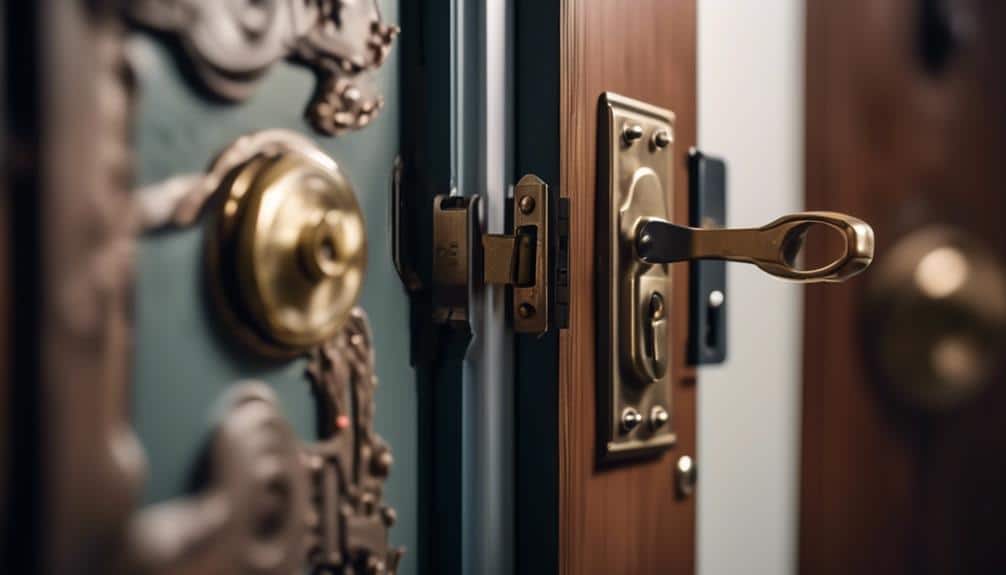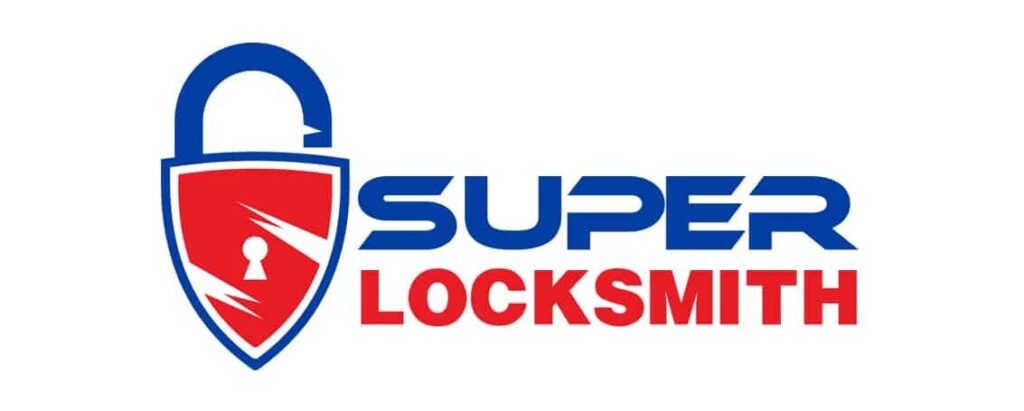As locksmiths, we are the gatekeepers who hold the keys to security.
In a world where protection is paramount, the question arises: what are the best access control systems for us to utilize?
With a plethora of options available, ranging from biometric access control systems to mobile access control systems, it's crucial to explore the different possibilities and find the key that perfectly fits our needs.
So, let's dive into the realm of access control systems, where security meets innovation, and uncover the most effective solutions that will unlock a world of possibilities for us and our clients.
Biometric Access Control Systems
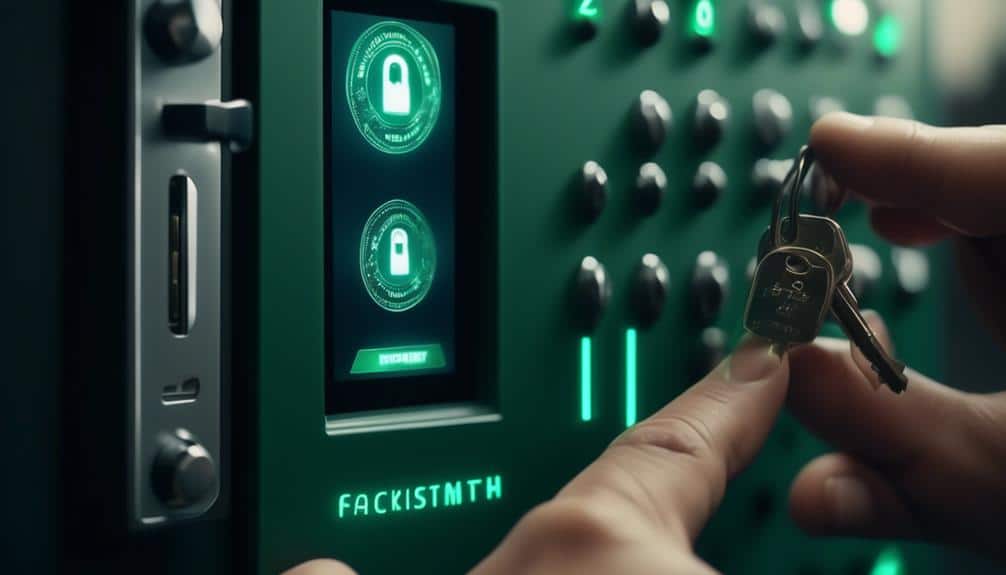
Biometric access control systems provide a highly secure and efficient method of granting or denying access based on the unique biological characteristics of an individual. These systems utilize advanced technologies such as facial recognition and fingerprint scanning to accurately identify individuals and control access to restricted areas.
Facial recognition technology is one of the key components of biometric access control systems. It analyzes the unique facial features of an individual to verify their identity. By capturing and comparing facial characteristics such as the distance between the eyes, the shape of the nose, and the contours of the face, the system can accurately determine if the person attempting access is authorized or not.
Fingerprint scanning is another widely used biometric technology. Each person has a unique pattern of ridges and valleys on their fingertips, which can be captured and stored in a database. When a person places their finger on a fingerprint scanner, the system compares the captured fingerprint with the stored template to authenticate their identity.
The use of facial recognition technology and fingerprint scanning in biometric access control systems ensures a high level of accuracy and security. These systems provide a reliable and efficient method of access control, eliminating the need for traditional methods such as keys or access cards.
Keyless Entry Systems
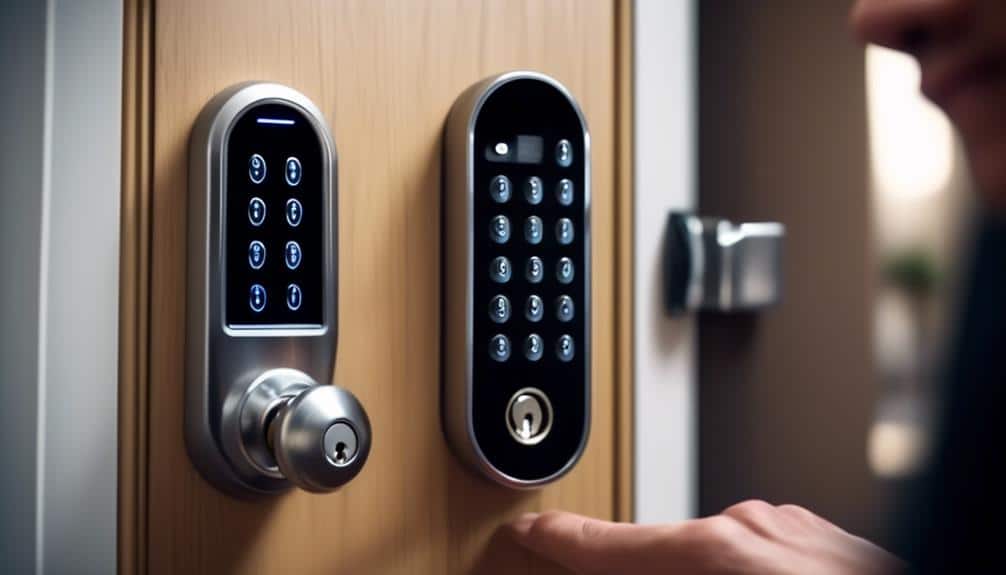
Keyless entry systems provide a convenient and secure method of accessing restricted areas without the need for traditional keys or access cards. With the advancement of smart home technology, keyless entry systems have become increasingly popular in both residential and commercial settings. These systems utilize virtual access control, allowing users to remotely control and monitor their access points through a smartphone or computer.
One of the main advantages of keyless entry systems is their ease of use. Instead of fumbling for keys or swiping access cards, users can simply enter a unique code or use their fingerprint to gain entry. This eliminates the need to carry multiple keys or worry about losing them.
In addition to convenience, keyless entry systems offer enhanced security features. Virtual access control allows for easier management of access privileges, enabling administrators to quickly grant or revoke access rights. Furthermore, these systems often include features such as tamper alarms and notifications, providing an added layer of protection against unauthorized access.
Proximity Card Access Systems
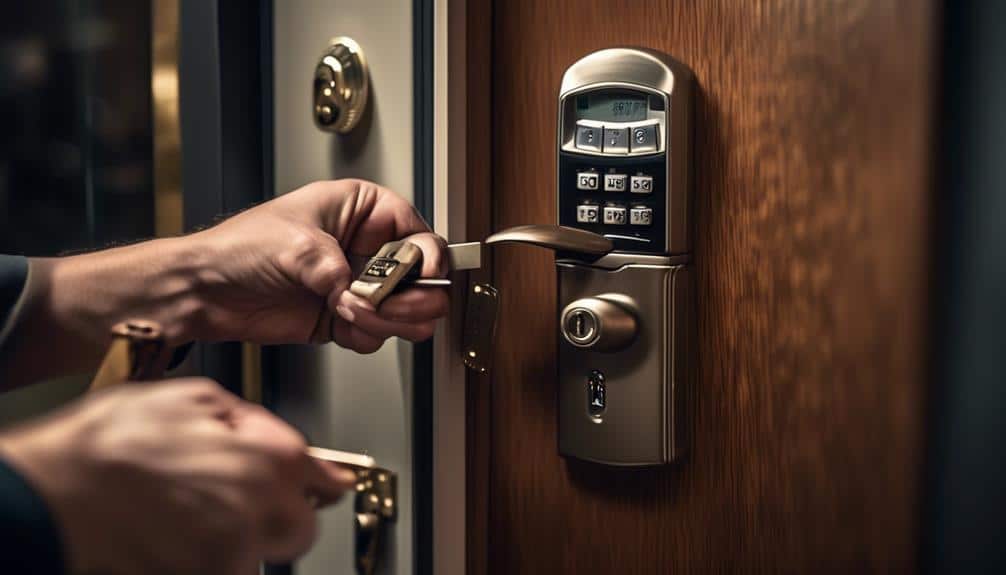
Proximity card access systems utilize proximity cards, which are small plastic cards embedded with a radio frequency identification (RFID) chip, to grant access to restricted areas. These systems offer several advantages in access control.
Firstly, proximity cards are more secure than traditional keys or swipe cards, as they can't be easily duplicated or forged. The RFID chip within the card communicates with the card reader, allowing for quick and convenient access. Additionally, proximity cards can be easily deactivated if lost or stolen, rendering them useless to unauthorized individuals.
Proximity card access systems can also be integrated with other security measures to enhance overall protection. For instance, they can be combined with biometric technologies, such as fingerprint or iris scanners, to provide an additional layer of verification. This dual authentication process further reduces the risk of unauthorized access.
Moreover, these systems can be linked to video surveillance or alarm systems, allowing for real-time monitoring and immediate response to any security breaches.
Wireless Access Control Systems
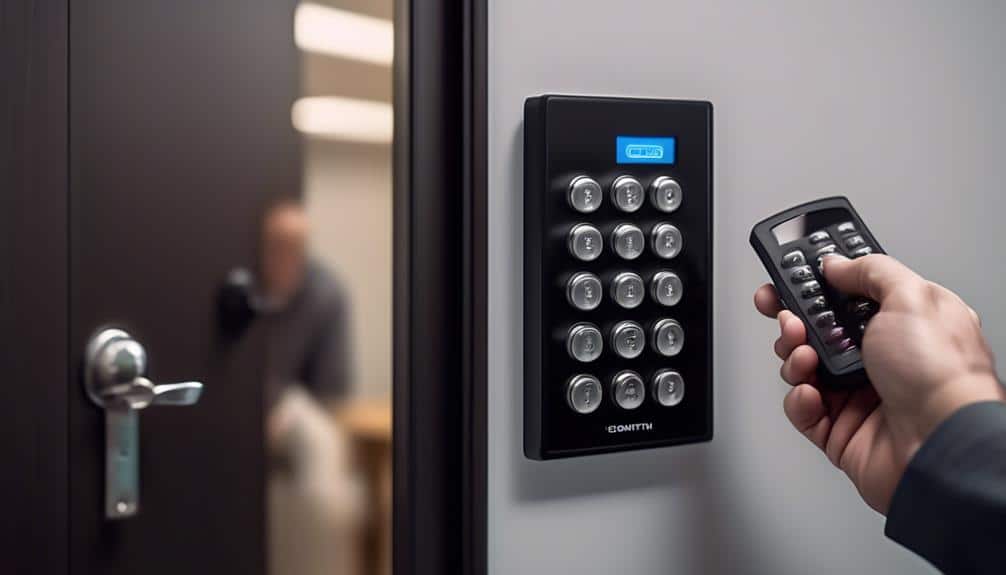
To further advance access control technology, locksmiths can explore the efficiency and convenience of wireless access control systems. These systems offer numerous benefits that make them a popular choice for both residential and commercial applications.
One of the key benefits of wireless access control systems is their flexibility. Unlike traditional wired systems, wireless systems don't require extensive wiring installations, making them easier and quicker to install. This not only saves time but also reduces the cost associated with labor and materials.
Another advantage of wireless access control systems is their scalability. These systems can be easily expanded or modified to accommodate changing security needs. With a wireless system, locksmiths can add or remove access points without the need for extensive rewiring, providing greater flexibility and adaptability.
Wireless access control systems also offer increased convenience. These systems can be integrated with smartphones or other mobile devices, allowing users to control access remotely. This eliminates the need for physical keys or access cards, streamlining the access control process and enhancing user experience.
In terms of the installation process, wireless access control systems typically involve the installation of wireless locks and access control panels. These components communicate wirelessly, eliminating the need for physical connections. Additionally, wireless systems can be easily integrated with existing security infrastructure, making them a versatile and cost-effective option for locksmiths and their clients.
Cloud-based Access Control Systems
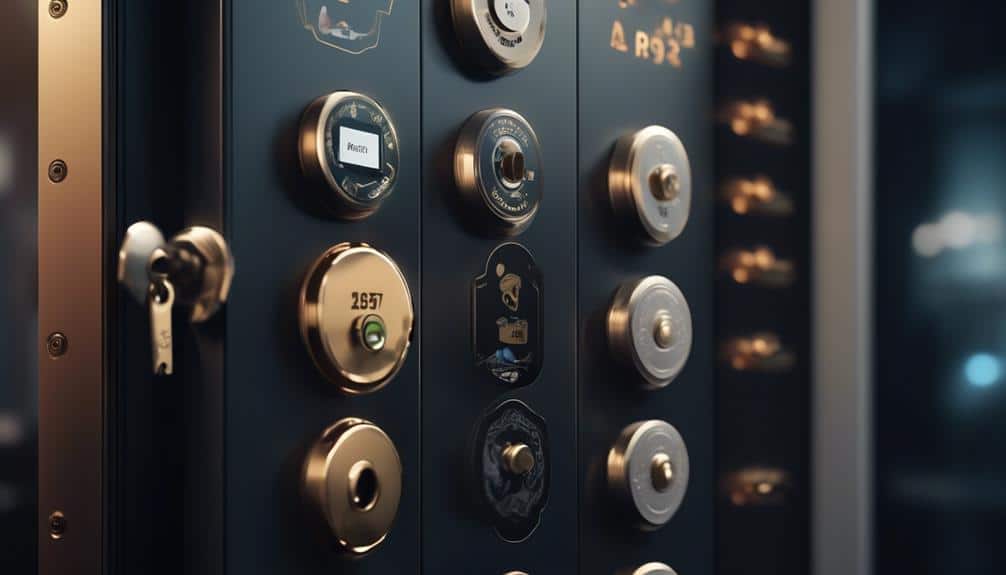
Cloud-based access control systems offer enhanced security features and remote access management capabilities.
With these systems, we can enjoy advanced authentication methods, such as biometric or multi-factor authentication, ensuring only authorized individuals can access the premises.
Additionally, the cloud-based nature of these systems allows for convenient and efficient remote management. We can grant or revoke access privileges, monitor activity, and receive real-time notifications from anywhere, at any time.
Enhanced Security Features
When considering advanced security features for access control systems, utilizing a cloud-based solution can provide enhanced protection and flexibility. Cloud-based access control systems offer a range of enhanced security features that can greatly benefit locksmiths and their clients.
Here are some key features to consider:
- Integrated Alarm Systems:
- Cloud-based access control systems can seamlessly integrate with alarm systems, allowing for immediate notifications and alerts in the event of unauthorized access or security breaches.
- This integration enables locksmiths to quickly respond to potential threats and take necessary actions to mitigate risks.
- Surveillance Integration:
- Cloud-based access control systems can also integrate with surveillance systems, enabling locksmiths to monitor and record activities in real-time.
- This integration provides an additional layer of security by allowing locksmiths to identify any suspicious activities and take proactive measures to maintain the safety of the premises.
Remote Access Management
We can effectively manage remote access through the use of cloud-based access control systems. These systems allow us to remotely control and monitor access to buildings and facilities, providing enhanced security and convenience. One key feature of cloud-based access control systems is mobile app integration, which allows authorized users to manage access permissions and monitor security remotely through their smartphones or tablets. This eliminates the need for physical keys or access cards, making it easier to grant or revoke access as needed. Another important feature is virtual key management, which enables us to create and distribute virtual keys to authorized users. These virtual keys can be easily revoked or updated, providing an added layer of security. Overall, cloud-based access control systems offer a flexible and efficient solution for managing remote access.
| Key Features | Benefits | Examples |
|---|---|---|
| Mobile app integration | – Remote access management<br>- Convenience for users<br>- Real-time monitoring | – Kisi<br>- Brivo<br>- Openpath |
| Virtual key management | – Easy access control<br>- Enhanced security<br>- Scalability | – Salto<br>- Nexkey<br>- Openpath |
| Cloud-based architecture | – Centralized control<br>- Remote management<br>- Scalability | – Openpath<br>- Kisi<br>- Brivo |
Mobile Access Control Systems
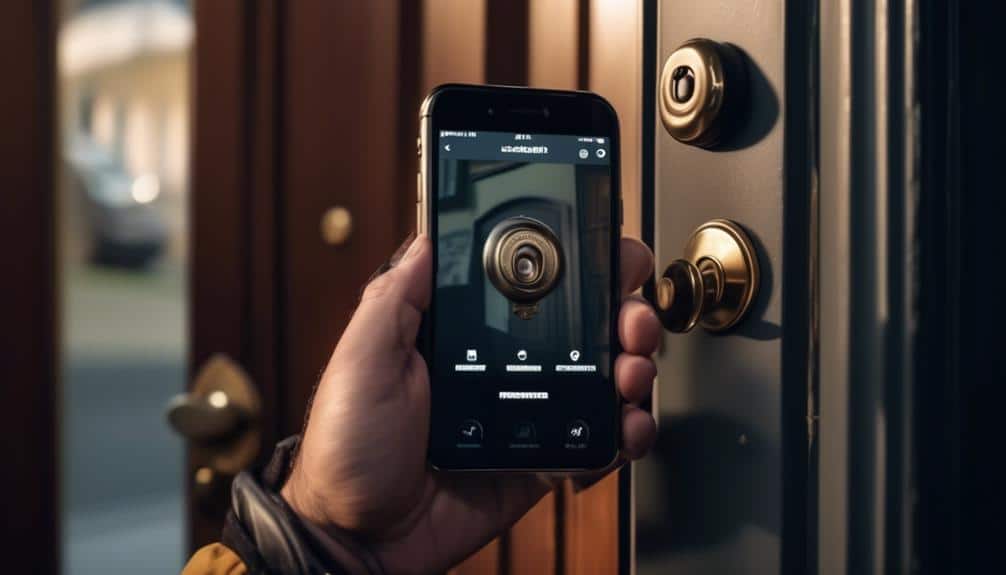
Mobile access control systems provide locksmiths with a convenient and efficient method for managing and granting access to secure areas using smartphones or other mobile devices. These systems offer several benefits and advantages of keyless entry, making them a popular choice in the locksmith industry.
Here are some key advantages of mobile access control systems:
- Enhanced convenience: With mobile access control, locksmiths can manage access remotely without the need for physical keys or cards. This eliminates the hassle of carrying and managing multiple keys or access cards.
- Increased security: Mobile access control systems provide a higher level of security compared to traditional key-based systems. They offer features like two-factor authentication, biometric verification, and remote monitoring, which help prevent unauthorized access.
- Flexibility and scalability: Mobile access control systems are highly flexible and easily scalable, allowing locksmiths to add or remove users and modify access permissions easily. This makes them suitable for a wide range of applications, from small offices to large commercial buildings.
- Real-time access management: Mobile access control systems enable locksmiths to monitor and manage access in real-time. They can instantly grant or revoke access, track entry and exit times, and receive notifications for any suspicious activity.
- Cost-effective: Implementing mobile access control systems can result in cost savings over time. With no physical keys to replace or access cards to issue, locksmiths can reduce expenses related to lost or stolen keys and the need for rekeying.
Multi-factor Authentication Systems
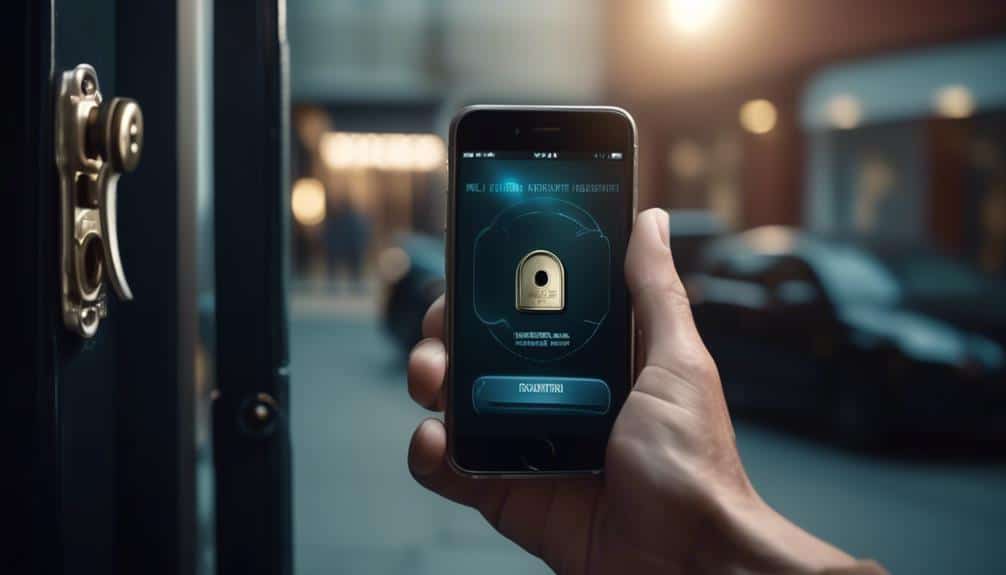
To further enhance security measures, locksmiths can implement multi-factor authentication systems as an additional layer of protection for their mobile access control systems. Multi-factor authentication (MFA) combines two or more authentication factors to verify the identity of a user. By requiring multiple pieces of evidence, such as something the user knows (password), something the user has (token), or something the user is (biometric), MFA significantly reduces the risk of unauthorized access.
One popular method of MFA is token-based authentication, where a physical or virtual token is used to generate a one-time password (OTP) that is then used as part of the authentication process. Tokens can be in the form of hardware devices, such as key fobs or smart cards, or software applications installed on a mobile device. These tokens add an extra layer of security by ensuring that only authorized users with physical possession of the token can access the system.
Another important aspect of access control systems is role-based access control (RBAC), which limits access to resources based on the roles assigned to individual users within an organization. By assigning specific roles and permissions to users, locksmiths can ensure that only authorized personnel have access to sensitive data or restricted areas. RBAC helps to prevent unauthorized access and minimize the risk of security breaches.
Implementing multi-factor authentication and role-based access control can significantly enhance the security of mobile access control systems for locksmiths. By incorporating these measures, locksmiths can protect against unauthorized access and ensure the safety of their clients' properties and assets.
| Advantages of Multi-factor Authentication | Advantages of Role-based Access Control |
|---|---|
| Provides an additional layer of security | Limits access to sensitive information |
| Reduces the risk of unauthorized access | Prevents unauthorized actions |
| Enhances overall system security | Simplifies user management |
| Mitigates the impact of stolen credentials | Enables granular access control |
Frequently Asked Questions
Can Access Control Systems Be Integrated With Existing Security Systems Such as CCTV Cameras?
Yes, access control systems can be integrated with existing security systems such as CCTV cameras.
However, there are some integration challenges that locksmiths should be aware of.
One of the benefits of integrating access control systems with CCTV is the ability to have a comprehensive view of security events. This allows for better monitoring and identification of potential threats.
Additionally, the integration provides a seamless user experience as users can access both systems with a single credential.
How Do Biometric Access Control Systems Ensure the Security and Accuracy of Fingerprint or Facial Recognition Data?
When it comes to biometric access control systems, we can assure you of their ability to ensure both security and accuracy of fingerprint or facial recognition data. These systems employ state-of-the-art technology to protect against security risks and safeguard sensitive information.
With advanced algorithms and encryption techniques, biometric access control systems provide robust data protection. By analyzing unique physical attributes, they offer a reliable and efficient method of verifying identities, minimizing the risk of unauthorized access.
Are Keyless Entry Systems Compatible With Both Residential and Commercial Properties?
Keyless entry systems are compatible with both residential and commercial properties. The installation process involves programming the system to recognize authorized users and granting them access. These systems offer numerous benefits, such as enhanced security, convenience, and flexibility.
In residential properties, keyless entry systems eliminate the need for physical keys, reducing the risk of lockouts and unauthorized access.
In commercial properties, they provide efficient access control, allowing different levels of access for employees and visitors.
What Measures Are in Place to Prevent Unauthorized Duplication or Cloning of Proximity Cards?
Prevent unauthorized duplication or cloning of proximity cards?
Our access control systems employ cutting-edge measures to ensure maximum security. We've implemented robust encryption protocols and sophisticated algorithms to safeguard against any unauthorized attempts.
Our state-of-the-art technology provides a multi-layered approach, making it virtually impossible for anyone to duplicate or clone proximity cards.
Rest assured, our systems are designed with your security in mind, offering peace of mind and protection against any potential breaches.
Can Cloud-Based Access Control Systems Be Easily Scaled up or Down to Accommodate Changes in the Number of Users or Locations?
Cloud-based access control systems offer several benefits for locksmiths and their clients. One of the key advantages is scalability, which allows these systems to easily adapt to changes in the number of users or locations. This flexibility is crucial for locksmiths as it enables them to efficiently manage access control for their clients.
Another advantage of cloud-based systems is centralized management. With all access control data stored in the cloud, locksmiths can easily manage and monitor their clients' access control systems from a single, centralized platform. This centralized management makes it easier to track and control access across multiple locations, saving time and effort for locksmiths.
Real-time updates are also a valuable feature of cloud-based access control systems. Any changes or updates to access permissions can be made in real-time, ensuring that the system is always up to date. This eliminates the need for manual updates and reduces the risk of unauthorized access.
Remote access capabilities are another benefit of cloud-based systems. Locksmiths can remotely access and manage the access control system, allowing them to troubleshoot issues or make changes without being physically present at the location. This remote access capability saves time and resources for locksmiths, as they can address client needs quickly and efficiently.

